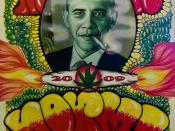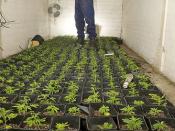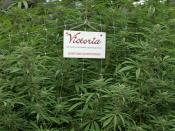Marijuana Have you ever smoked marijuana before? Some call it a sin, some call it just plane fun. But in any case it is illegal almost everywhere in the world and I strongly dissagree with that. I feel marijuana should be legal and here is the official statistics on the plant Marijuana. And some of the reasons why I feel it should be legalized for medical and recreational use.
THC or Tetrahydrocannabinol is the active ingredient in Marijuana it causes what appears to be the slowing down of time and is also considers a downer or depressant. THC can be found in three forms Marijuana, Hashish, and Hashish Oil. The plant is most commonly know as a weed usually takes six to seven months to start "budding"� the bud is the part of the plant that is usually smoked and or eaten. The plant requires a rather warm and moist place to grow properly.
Hashish is defined in the websters dictionary as a narcotic derived from hempthat is chewed, smoked or drunk for its intoxicating effects.
Hashish is most widely used in the Netherlands and Germany in places called Hashish Bars. There you can purchase it and use it which is very uncommon for most countries because it is illegal every where else.
The history of cannabis products and their use has been long, colorful and varied. "To the farmer, cannabis is a fiber crop; to the physician, it is a mystery; to the user, fun; to the police, a menace; to the trafficker, a source of profitable danger; to the convict or parolee and his family, a source of sorrow" (Mikuriya, 1969: 34). The fact is that cannabis has been held simultaneously in high and low view at various times throughout recorded history, particularly in our own times.
The amount of information available on the medical application of cannabis is considerable.
Occasionally certain references have been condensed or erased, but this should not detract from the completeness of the report.
This historical survey of the medical uses of marijuana is introduced by a broad overview of its use, including brief notes on current and projected research, and then considers specific historical settings and circumstances in ancient China, moving on to Egypt, India, Greece, Africa, and the Western World.
Cannabis has been used therapeutically from the earliest records, nearly 5,000 years ago, to the present day (Mikuriya, 1969: 34) and its products have been widely noted for their effects, both mentaly and physiclly, throughout the world. Although the Chinese and Indian cultures knew about the properties canabus from very early times, this information did not become general in the Middle East until after the fifth century , when travelers, traders and adventurers began to carry knowledge of the drug to Persia.
Several years after the return of Napoleon's army from Egypt, cannabis became widely accepted by Western phacians. Previously, it had had limited use for such purposes as the treatment of burns. The scientific members of Napoleon's forces were interested in the drug's pain relieving and sedative effects. It was used during, and after his rule in France.
In the United States, medical interest in cannabis use was evidenced in 1860 by the convening of a Committee on Cannabis Indica of the Ohio State Medical Society, which reported on its therapeutic applications (McMeens, 1860: 1). Between the period 1840-1890, Walton states that more than 100 articles were published recommending cannabis for one disorder or another.
Concern about cannabis as an intoxicant led the government of India to establish the India Hemp Commission of 1893-94 to examine the entire question of cannabis use in India.
Paralleling the question over cannabis use in the latter half of the 19th century was the growing medical use of other medications superior to cannabis in their effects and more easily controlled as to dose. Consequently, medical use of cannabis declined and cannabis began to lose support of the medical profession.
During the years between 1856-1937, cannabis lost its image as a medicine and was left with a disreputable image as an intoxicant. Strong public reaction coupled with a campaign in the public press led to a federal anti-marijuana law in 1937. (The drug was illegal in many states before 1937.) The issue of medical use remained active, however, and Dr. William C.
Woodward, Legislative Counsel to the AMA, an opponent of cannabis use and the only physician to be a witness at the Taxation of Marijuana hearings, stated: There are exceptions in treatment in which cannabis cannot apparently be successfully subsituted for. The work of Pascal seems to show that Indian Hemp has remarkable properties in revealing the subconscious; hence, it can be used for psychological, psychoanalytic and psychotherapeutic research (Hearings, House of Representatives, 1937: 91).
Although cannabis drugs are generally regarded as obsolete and rarely used in "western" medicine today, cannabis is "still used extensively in the systems of medicine of the Indian-Pakastani subcontinent" ("The Cannabis Problem, 1962: 27). The Pharmacopoeias of India mention cannabis use in the recent past. Two preparations of cannabis, a liquid extract and a tincture, are listed in the 1954 and 1966 Pharmacopoeias of India which contain descriptions of cannabis and its extract and how it is made (Chopra & Chopra, 1957: 9).
A more recent source makes reference to the fact that "in contemporary India and Pakistan, there continues to be widespread indigenous medical, 'quasi-medical,' and illicit use of both opium and cannabis" (Chopra & Chopra, 1957: 12-13). hemp resin is occasionally used in the native medicines of the countries where it is collected.
Especially in India where, "the medical systems . . . make much use of cannabis as a sedative, hypnotic, analgesic, anti-spasmodic and anti-hemorrhoidal" (Bulletin on Narcotics, 1962:27).
According to the Canadian Commission of Inquiry into the Non-Medical Use of Drugs: There is no currently accepted medical use of cannabis in North America outside of an experimental context. Although cannabis has been reported to produce an array of possibly useful medical effects, these have either not been adequately investigated, or can be replaced by using other more readily available and convenient drugs. The natural product's variability in potency and instability over time are among the factors which have led to its disfavor in Western 20th century medicine.... cannabis has been employed in the past, and is currently used illicitly in North America, to reduce the secondary symptoms and suffering caused by the flue and the common cold. These . . .
alleged therapeutic properties of cannabis have not been adequately studied in a scientific context, and their general medical potential remains a matter of conjecture (1970: 74).
Although cannabis was once used for a wide variety of medical disorders and has even been demonstrated to have antibacterial activity, there are at present no well substantiated indications for its use. It is no longer an official drug. Preparations are rarely available and prescriptions are regulated by special tax laws.
Despite the many statements discounting cannabis' medical usefulness, some authorities maintain that its medical value might be reborn through further research and/or use. David Solomon, in his foreword to The Marihuana Papers (1968: xxi) argues that: Marihuana should be accorded the medical status it once had in this country as a legitimate prescription item. After 1937, with the passage of the Marihuana Tax Act it became virtually impossible for physicians to obtain or prescribe marihuana preparations for their patients. Therfore the medical profession was denied access to a versatile pharmaceutical tool with a history of therapeutic utility going back thousands of years.
Now we'll go with the health part of the plant. Many "Educational" and and health videos have you believe that Marijuana is going to ruin your life and leave you brain dead, but there has been no known proof that it has had any long term brain damage to the human brain. The only damage suggested by the American Medical Association is that it effects the short term memorey and they only believe your memory will be affected as long as you smoke it in large amounts afterwards when you quit they say memorey should retrun to normal. The American Medical Assosiation also states that the drug is better in your lungs the Tabacco in the way that it does less damage because people smoke it less to get the effects needed. However it would still be healtheir to ingest the drug. There have also been false reports madeon the drug to scare people away from using it. Some from saying it cause insantiy to death. Ethat A. Nadelman, assistant professor of politics at Princton University supports the legalization of Marijuana because its applications to medical use in many ways.
Deaths due to weed. So far there have been no deaths due to Marijuana recorded, in fact the only way to actuallly overdose on the drug is by smoking three quarters of a ton of it in fifften minutes! Doing this is humanly impossible in fact you are more likely to pass out before accomplishing that. The only deaths are realted to people using the drug then trying to perform other tasks like driving or to perform some other task which involves large amounts of concentration. Here is a chart showing the deaths in overdose and or long term use of other drugs in compariosn to Marijuana per year.
* Tabbacco................................340,000-395,000 Alcohol (excluding accident or crime).......125,000+ Prescription.............................24,000-27,000 Illegal Drugs (excluding Marijuana)...........3,800-5,200 Marijuana..............................0 *Source National Institute on Drug Ause, Monitoring the Future: A continuing study of the Lifestyles and Values of youth, 1989 survey results The drug hasn't been involved in many if at all any violent crimes.
In fact Marijuana is not a violence inducing drug, it is the exact opposite, it is an anti-violent drug or a pacifist. Every year millions of people smoke Marijuana, from Artists and Musicians to Lawyers and Writers.
I feel their probably some of the happiest people alive. I also feel Marijuana is in no way addictive and the statement of the drug bieng a stepping stone for greater more dangerous drugs is false. Caffine, Sugar, or alcohol all have negitve side effects but they seemed to be over looked because society already craves those things. The only crimes ive ever heard about are usually having possesiong of the Marijuana or smoking Marijuana.
I feel Marijuana should be legalized for medical and recreationl use. Its better foryou than ciggertes, and its been around forever. Next time your at your local library or On-line check it out for your self.
Write your local congress man and next time there is a vote, vote yes on legaliation of marijuana.


